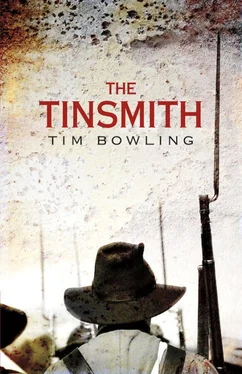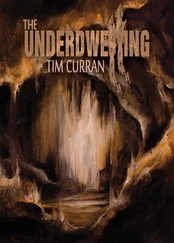Anson touched his stomach instinctively but only blinked in response.
The Scotsman continued with a visible shudder. “I was at the embalmer’s tent. Unpleasant fellow, clammy-looking as death itself. Must be from the work. Anyway, two officers were asking him about that slave owner’s mutilated body. I rather think they suspected him of trying to cash in on it.” The Scotsman’s thick moustache bristled. “And I canna blame them. There’s some here would rob the dead of their souls if they thought they could make a dollar from the sale.” He paused, let his eyes roam over the dozens of tents. “The embalmer… I heard him mention a very tall soldier who’d been quite active bringing him bodies. I didna think of it at the time, but seeing you again, doctor… I was reminded, you see.”
Another cramp almost doubled Anson over. But he remained standing, sweat dripping into his eyes, stinging them. He cleared his throat huskily.
“The soldier you refer to”—his voice, booming out, half frightened him—“he left with his regiment yesterday.”
The Scotsman smiled. His whole face became a camera, the lenses wide open, reading, reading.
“Ah, that’s a good thing, doctor. I’m pleased to hear it. I’m no friend of the propertied myself, and when they’re slave owners, well… my sympathies would be of the abolitionist bent, you see.”
He knew something, then, but what? Anson heard a low groan of misery from behind him. It might have come from his own mouth. He had lied again and knew he would continue to do so if necessary. But how much did the Scotsman really suspect?
“My apologies, doctor. I must take full advantage of the light that’s left.”
As quickly as that, he bowed slightly, gripped the two sides of his coat together, and strode away.
Anson watched him climb up onto the board of the wagon. Then a strange, glassy clinking began as the horse moved forward and the wagon slowly shrank to a black smudge along the pike road. Eventually Anson brought his gaze back to the greasy shadows in the clustered tents—a mass of cocoons filled with putrefaction. Somewhere inside one of them breathed the tall soldier he had given new life. Anson realized it would be best if the newly minted William Dare moved on as soon as possible.
September 19, the battlefield at Antietam
Horace Greaver’s mood had turned as foul as the air. He still smarted from the failure of the truce the afternoon before. With his wagon containing three Rebel officers neatly solidified with mercury and resting naturally in lovely zinc-lined coffins, he had bumped across the battleground to the still-contested area where the Federal and Confederate surgeons gathered and exchanged wounded. The sun dazzled off the broken muskets and sabre tips, then sank inexorably into the bared flesh of the dead.
He climbed stiffly out of his wagon and approached a Rebel surgeon who was busy directing stretcher-men. Clearing his throat loudly, he said, “Pardon me, sir. Horace Greaver, embalming surgeon, at your service.”
The willow-thin man looked up, his eyes dark as bruises on a transparent apple. He glared a few seconds, then turned back to a soldier trembling on the ground.
“I realize, sir,” Greaver went on, offended by being disregarded but not wanting to let the offence interfere with business, “that you are engaged in your most important and honourable duties. If you could just direct me to your embalming surgeon?”
To Greaver’s amazement, the Rebel snapped up like a branch released. His nostrils flared whitely.
“We do not have such… such individuals in the Army of Northern Virginia.” He melted back toward the earth.
Gardner removed a handkerchief and mopped the sweat from his brow. As always, a cluster of flies hovered around his hands. He did not know how to proceed. The Rebel’s unexpected scorn, as much as his information, had left him both impressed and winded. But when he concentrated on the lost profit—a colonel, fully preserved!—he felt dizzy. He tried to explain.
“I am sure, doctor, that the families of the South are anxious to have the bodies of their loved ones returned to them. In my wagon, I have the beautifully preserved corpses of three of your officers, and I am willing, for a fair price, to put them into the hands of whoever is responsible for seeing that the soldiers of your army are returned to their homes.”
It hardly seemed possible to Greaver, but the Rebel’s face flushed. His jaw worked rapidly but no words came out. Then he put two fingers into his mouth and whistled, short and sharp.
In the near distance, a group of Rebel soldiers turned at the sound. Greaver quickly understood the surgeon’s intention. With haste, he returned to the wagon, climbed in, puffing heavily, and snapped the reins. He did not look back, but he could imagine the lead balls sinking into his flesh, almost feel the blood draining from his vessels.
But no sounds followed him. After five minutes, reassured that there was no pursuit along the dusty turnpike, he slowed the horse to an amble and began to calculate his chances of getting payment directly from the Southern families. How would he manage it? No doubt they’d be willing to pay, Rebels not being so different than Northerners in their customs of death. But how could he collect? Or, for that matter, be sure to get the bodies shipped with a guarantee of delivery? If only he had access to the president, Greaver was sure that Mr. Lincoln would do everything in his power to see that the embalmed Rebels made it home safely. But not all embalming surgeons were treated equally; some, like Dr. Holmes, had influential contacts. Greaver, on the other hand, was left solely to his own devices. And he had to face the hard facts: the truce had turned into a debacle of lost profit. A colonel! And he’d spent two hours injecting him too. A lovely job, all to no avail.
Now Greaver stood in the comfortless shade afforded by a thin tarp, injecting a couponed Union private through the armpit, and encouraged only by the fact he’d paid that mad soldier nothing for the colonel’s corpse. Still. Waste! This particular loss gnawed at him like a maggot in a festering wound. Of course, there was still considerable profit to be made from the Union officers alone—he would do well from this battle, very well indeed—but the loss rankled, as if he’d been the victim of a confidence man. But that soldier had been too mad to play tricks. No. Greaver could not deny it: what truly bothered him was that he, a graduate of the two-year diploma in surgery, had not known that the Rebels had no embalmers.
He drew in a deep breath of decay, pulled at the soldier’s cheek, found it satisfactorily stiff, and decided to suture the incision. As he did so, he heard horses rapidly approaching.
Tomkins emerged from the tent, twirling the waxed ends of his moustache.
“Officers,” he said. “I fear, doctor, that this does not augur well.”
Greaver grunted and stepped away from the table. He whisked a few flies away, put one hand over his thick lenses, and watched the three horses draw near. Just beyond them, as if pulled in their wake, came a wagon much like his own. One of his competitors, no doubt, sniffing out an opportunity. But Greaver knew he had nothing to be concerned about from the officers. The president himself favoured sending embalmed soldiers home. Even so… even so, he knew that Tomkins possessed a rare instinct for trouble, which was why he’d vanished into the tent, withdrawing like a damned snake into its hole. Greaver grumbled and covered the corpse with a blanket. If Tomkins wasn’t so useful, Greaver had a mind to tell him that his services were no longer required.
The officers arrived, well striped and fine looking, one young and one old. They’d make attractive corpses someday, Greaver mused, nervously eyeing them as they dismounted. The third rider was very different. Small and darkly clothed, his tiny eyes darting above a pointed nose and tight mouth, he had the appearance of a wet otter and even seemed to slide off his horse. But the two officers turned in unison and briefly conferred with him. Then, soberly, they strode toward Greaver, their spines as upright as the sabres at their sides.
Читать дальше












